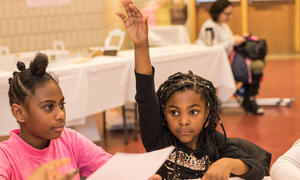Our Humanity Is Bound Together: Discussing the Holocaust
International Holocaust Remembrance Day is commemorated on January 27, the anniversary of the liberation of Auschwitz-Birkenau concentration camp in 1945. We honor the memory of the 6 million Jews and the millions of Roma, Sinti, Slavs, disabled persons, LGBTQ+ individuals, political dissidents and others who were murdered in the Holocaust. And we encourage learning from the survivors as we reflect on the significance of this history.
- Acclaimed Documentary ‘One Survivor Remembers’ Urges All to Never Forget
- One Survivor Remembers
- ‘Hope, Despair and Memory’
